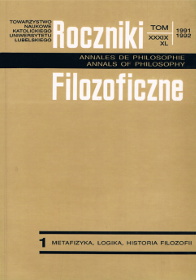The Language of Metaphysics and Ordinary Language in Process Philosophy
Abstract
The aim of the article is to define the differences and their sources between C. Hartshorne’s and A. N. Whitehead’s approach to the relation between ordinary language and the language of metaphysics. Hartshorne looks for such a language of metaphysics that would be compatible with ordinary language and this is why he declares some kinship with the programme of philosophy presented by linguistic analysts trying to show his philosophical solutions as consistent with common sense views. Whitehead, on the contrary, strongly opposes limiting the philosophical vocabulary to terms taken from oridnary language as, in his opinion, this is the source of dogmatism in contemporary philosophy. Since the main aim of philosophy is not so much achieving precision as presenting new, creative approaches to reality, it is rather the language of philosophical systems and the language of literature, especially that of poetry, that is its ally. Compared with Whitehead’s, Hartshorne’s view of the language of metaphysics can be defined as more precisionistic. Hartshorne is convinced that he has at his disposal logical procedures allowing him to remove obscurity and ambiguity from metaphysical terms as well as to point to and eliminate absurd expressions from the existing philosophical systems.
The sources of the above mentioned differences between Hartshorne and Whitehead can be seen in that they attempt to express the process vision of the world with respect to different „dimensions” of reality. Whitehead concentrated on constructing terminology which would express the intuition that reality basically consists of microcosmic units whose nature is that of a process. He was less concerned with the macrocosmic world which was the subject of Hartshorne’s interest.
Copyright (c) 1992 Roczniki Filozoficzne

This work is licensed under a Creative Commons Attribution-NonCommercial-NoDerivatives 4.0 International License.





